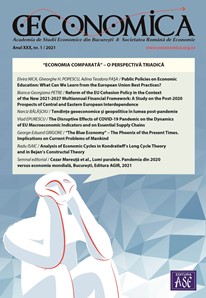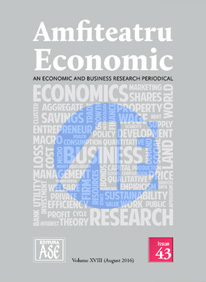Rubrics » Bridging News
Independence through Interdependencies
The study titled The role of regional cooperation mechanisms in the current geopolitical context – opportunities and challenges for Romania, authors: Octavian-Dragomir Jora (coord.), Marius-Cristian Neacșu and Cezar Teclean, under the auspices of the European Institute of Romania, attempts to offer a lecture entry-point – one of the many potential ones – regarding Romania’s regional cooperation mechanisms, useful not only to the purveyors of external policies, but to all those who internalize its shortcomings. This approach attempts to make itself useful by signalling the multitude of interpretations of the international reality, which goes from the level of the common citizen all the way to chancelleries and which demands a smart reconciliation and a sage reconnecting at maybe the hardest calculable parameter when it comes to the very existence and functioning of a state: the national interest.The formulated conclusions – out of which a brief excerpt is republished below – emphasise, rather than exhaust, the wide range of possibilities of regional cooperation, in a heterogeneous/eclectic set of catalogued formats/mechanisms, which must be detached, before anything else, from the realm of monotony and rigidity. We are talking about promising, uncharted fields, but also about upsetting redundancies; about lucrative components, but also about bureaucratic laziness; about room for national initiative, but also about convenient conformity. These aspects are further complicated by the upsurge of the contestation of the international rule-based order. Here is a concise inventory of some generic ideas – concentrated in 10 points – which emerged from the research process, while a bit more extensive summary, preceding the study in full (in Romanian) is to be retrieved here. More
Models of Historical Interpretation
[Originally serving as two introductory lectures to my history courses, the following article was published at request of the editor in Contra Mundum 11 (Spring 1994): 12-20 under the same title. Long out of print, I hope these observations will prove to be of some value to another generation of readers.] More
Beyond Borders: An In-Depth Exploration of the Implications of the Dispute between Venezuela and Guyana Over the Essequibo Region
This article provides a comprehensive and detailed analysis of the territorial dispute between Venezuela and Guyana over the Essequibo region, capturing its historical roots, evolution, and current situation. The research focuses on the influence of natural resources discovered in shaping the politico-economic interests that perpetuate instability, employing a multidisciplinary approach that unveils diplomatic interventions and the dynamics of international involvement. The article specifies the economic implications for each state and offers a perspective for a peaceful resolution, emphasizing regional stability, economic development, and bilateral cooperation. The conclusions of the article highlight the necessity of resolving this dispute, providing an analysis with practical implications for decision-makers, diplomats, or international organizations addressing similar challenges in other disputed territories. More
Neighbourly Bickering: The Argentine – Chilean Dispute for the Southern Patagonian Ice Field
Over the past two hundred years, Chile and Argentina have developed a fruitful bilateral relationship, marked by ups and downs, where any conflict was resolved through agreements and negotiations. However, the greatest difficulties have arisen in delimiting the borders for the Southern regions, specifically the Campos de Hielo Sur/ The Southern Patagonian Ice Field, where each state mapped out spaces that overlapped graphically. There have been multiple attempts to solve this issue by establishing a definitive limit, engaging in high-level conversations between the governments involved. Despite numerous territorial concessions from Chile, there still remain unresolved aspects and unjustified decisions. More
Small Island, Huge Stakes: the Dispute between Iran and the UAE for Abu Musa
Abu Musa is a small island situated in the Persian Gulf whose strategic position allows the power that controls it to influence the maritime traffic that passes through the Strait of Hormuz. This characteristic made it the point of contention between Iran and the United Arab Emirates, both states actively claiming their sovereignty over the island along with its sister islands of the Greater and Lesser Tunb.Iran is the de-facto ruler of these important islands since 1971, when it orchestrated their invasion at a time when they were in the possession of the Emirate of Sharjah, now part of the United Arab Emirates (Mobley, 2003). Regarding the island of Abu Musa, Iran maintains that the territory is an inalienable part of the state, refusing any kind of negotiations that imply otherwise. In turn, the UAE continues to claim the islands as part of the Emirate of Sharjah, which is one the Emirates composing it, and alongside other actors, advocates for negotiating a diplomatic solution to this dispute. More
Romania, Second Lowest Price Level in the EU for 2022
Romania had the second lowest price level in the EU for the year 2022, with a value of 59.3% relative to the European average. Bulgaria was first, with an index of 58.5%, and above our country were situated Poland (60.7%), Hungary (67.7%), Croatia (73.5%), Lithuania (78.8%) and Czechia (84.3%).*In 2022, the highest price level for consumer goods and services among the EU Member States was observed in Denmark (49% above the EU average) and the lowest in Bulgaria and Romania (41% below the average). More
The Trump Storm
2022 and 2023 saw a large number of suits brought against Trump, some of them legally and others still in the court of public opinion, from where his critics hope they will move into the courthouse. These cover a bewildering array of charges, ranging from rape to defamation to campaign finance fraud, and from improper use and storage of classified materials to insurrection. What are the charges? Trump has been charged with 34 counts of falsifying documents related to payments made to women with whom he had sexual affairs in order to buy their silence. The main woman involved was the porn actress Stormy Daniels, whose case has been discussed since the beginning of Trump's tenure. The payments were made by Trump's lawyer, Michael Cohen, and were reimbursed from Trump organization funds marked as legal expenses. Normally, such actions, however disgraceful, would constitute a misdemeanor for which Trump would be fined, but Cohen was also well-positioned in Trump's campaign, and a visionary prosecutor made him declare, as part of Cohen's 2018 agreement with authorities regarding his personal financial crimes, that those payments represented a campaign contribution because Stormy Daniels' silence and the silence of the rest of Trump's “harem” facilitated his election as President, not just savi More
Let’s Not Let the Politicians Play Bits and Bytes!
Before the political elections (about a year or so before), on the day of the vote and a little while after, the citizens remember the values of the Polis: the social contract (a subtle notion), democracy (more declaimed than digested), the rule of law (or the primacy of laws, which become frail when legality does not rhyme with justice). In the rest of the time between electoral cycles, we find ourselves, usually, in the posture of citizens nursing a profound displeasure towards the elected, who either forgo the promises for which we voted, or they deliver precisely the promises we did not vote for. Somehow, in between elections, power becomes something wielded by a few of “us”, as is the case on election day, when a majority of a narrow minority wins the day and decides the collective future. It leads to many people being in hock to the opposition, which is waiting for another turn of the wheel in their favour. This is the curse of the “social contract”, the high priests of the status quo assure us a bit cynically! More
Workshop Dedicated to the Incentives and Constraints that Affect the Dialogue and Positional Consensus within the Contemporary Epistemic Communities
The Advanced Research Institute of the Bucharest University of Economic Studies (BUES) organised, on November 15, 2023, the “Sense / consensus / nonsense in today’s scientific research: Big societal themes and how to approach them with discernment” workshop, an event which was included among the activities assigned to the “BUES excellence research development and promotion through the strengthening of the RDI processes, maintenance of the visibility of the results and impact on the economic sphere in the context of Open Science” [„Dezvoltarea și promovarea cercetării de excelență din ASE prin consolidarea proceselor de CDI, susținerea vizibilității rezultatelor și a impactului asupra mediului economic, în context Open Science”] – CNFIS-FDI-2023-F-0499. The main topic was related to the probing of the (lack of) existence of a market for ideas in the realm of social sciences, especially economics, seen in an inter-/multi-/trans-disciplinary light, as well as ascertaining its (lack of) function, emphasising the situation here in Romania, in a comparatively international context. The marketplace of ideas is a symbolical space which consists of at least three overlapping (or even interconnected) layers – the first one, in which researchers exchange their scientific conclusions based on carefully demonstrated/demonstrable validities; then the one where producers and consumers put forward their business ideas centred around profitability and based on their met/satisfied needs and, finally, the one in which, either in support or in spite of the will of the people and of civil society, politicians either regulate or outright ban some ideas which are considered plainly inadequate or which are simply decreed as inconvenient. More
Turning Point in NATO: Arming Itself with Entrepreneurs
At the 2022 Summit, which was hosted in Madrid, NATO officials presented an innovative multi-sovereign venture capital fund, now headquartered in the Netherlands. The establishment of the NATO Innovation Fund (NIF) in mid-2023 saw its 23 member nations pledging over 1.1 billion EUR in the first funding round to foster the Trans-Atlantic deep tech landscape. What has happened since then and can this mark the beginning of a “pot of gold” for Central and Eastern European states?The idea for a quasi-private investment scheme was presented almost two years ago during one of the Summits, yet only by mid-autumn 2023 the NATO-backed venture capital fund officially commenced its first financial rounds. This was done to infuse defense and security-oriented start-ups with some acceleration or seed capital, aspects that would bolster the alliance’s technological edge and development of firsthand innovative solutions. More
Civilization Is Built on Borrowed Capital
The historical dynamism and resilience of Western civilization bespeaks both the Christian faith that laid its foundations and its ability to transform the families, institutions, and cultures of the world into which it grew. As faith wanes within its realm, cultural revolutionaries vie for control over the estate and the distribution of its assets. The prospect of recovery or renewal of the West depends on the character and courage of its heirs to restore a depleted heritage. The following article is drawn from the first two sections of “Cultural Vandalism: Lust to Rule, Road to Ruin,” Wokeshevism: Critical Theories and the Tyrant Left, ed. Augusto Zimmermann and Joshua Forrester (Connor Court, 2023) 221-37. Reprinted with permission. More
Workshop Dedicated to Science Journalism and the Relations between Academia and the Mass Media, in an Era Full of Pressures Put on the Intellectual Climate and Informational Quality
“To know>knowledge>news: How to navigate through the socio-politico-economic relations in the post-truth and fake news era” [RO: „A ști >știință >știre: cum navigăm prin realitățile socio-politico-economice în epoca post-truthși fakenews”] is the aegis under which the Advanced Research Institute of the Bucharest University of Economic Studies (BUES) organised the workshop with the same name on November 8, 2023, a programme included among the activities subsumed in the “BUES excellence research development and promotion through the strengthening of the RDI processes, maintenance of the visibility of the results and impact on the economic sphere in the context of Open Science” [„Dezvoltarea și promovarea cercetării de excelență din ASE prin consolidarea proceselor de CDI, susținerea vizibilității rezultatelor și a impactului asupra mediului economic, în context Open Science”] – CNFIS-FDI-2023-F-0499. The debate started with the idea according to which the ultimate purpose of scientific research is, besides the maintenance of certain standards of excellence, that of contributing to the democratisation of the access to knowledge, while avoiding elitism and hermeticism in relation to the general public. This aspect is critical in the field of economics, which is found in the infrastructural area of general and civic education, as opposed to other areas that involve hyper-professional/specialised/technical knowledge. In addition, this approach/endeavour is made more and more difficult by the trends that relativize the truth and spreads misinformation (infodemics). In an international context, burdened by overlapping, asymmetrical and asynchronous crises (related to the management of climate change, migration, the post-pandemic society, security, resource accessibility, supply chains etc.), informed decisions, both public and private, become crucial. More



















